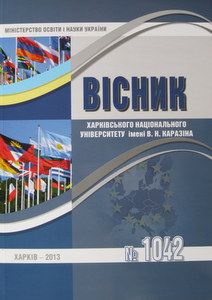Possible scenarios integration of developing countries
Keywords:
BRICS, economic integration, developing countries, international economic relations
Abstract
This paper accounts for the problem of the prospects of international integration associations in developing countries on the example of BRICS. Within the time of geopolitical change this problem is one of particular importance, because this international structures can change the global architecture. Development scenarios can be different and inconsistent, but developing countries can become an impetus for building a new world order. BRICS is a clear example of change in modern international economic relations and that is why it will be appropriate to describe the world economy transformation from this side.
Downloads
Download data is not yet available.
References
Воробьев Е.М. Экономическая теорія : учебное пособие / Е.М. Воробьев – Фортуна - пресс. 2000. – 410 с.
Голіков А. П. Міжнародні економічні відносини : підручник / А. П. Голіков О. А. Довгаль. – Х. : ХНУ імені В. Н. Каразіна. 2015. – 464 с.
Офіційний сайт журналу БРІКС [Електронний ресурс]. – Режим доступу : http: // www. bricsmagazine.com
Офіційний сайт газети Financial times [Електронний ресурс]. – Режим доступу : http : // www.ft.com
Голіков А. П. Міжнародні економічні відносини : підручник / А. П. Голіков О. А. Довгаль. – Х. : ХНУ імені В. Н. Каразіна. 2015. – 464 с.
Офіційний сайт журналу БРІКС [Електронний ресурс]. – Режим доступу : http: // www. bricsmagazine.com
Офіційний сайт газети Financial times [Електронний ресурс]. – Режим доступу : http : // www.ft.com
Cited
How to Cite
Pasmor, M. (1). Possible scenarios integration of developing countries. The Journal of V. N. Karazin Kharkiv National University. Series: International Relations. Economics. Country Studies. Tourism, (5), 50-53. Retrieved from https://periodicals.karazin.ua/irtb/article/view/6613
Section
The world economy and international economic relations
Authors who publish with this journal agree to the following terms:
- Authors retain copyright and grant the journal right of first publication of this work under the terms of a license Creative Commons Attribution License 4.0 International (CC BY 4.0).
- Authors are able to enter into separate, additional contractual arrangements for the non-exclusive distribution of the journal's published version of the work (e.g., post it to an institutional repository or publish it in a book), with an acknowledgement of its initial publication in this journal.
- Authors are permitted and encouraged to post their work online (e.g., in institutional repositories or on their website) prior to and during the submission process, as it can lead to productive exchanges, as well as earlier and greater citation of published work.




